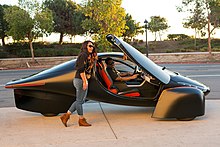Portal:Renewable energy
Introduction Renewable energy (or green energy) is energy from renewable natural resources that are replenished on a human timescale. The most widely used renewable energy types are solar energy, wind power and hydropower. Bioenergy and geothermal power are also significant in some countries. Some also consider nuclear power a renewable power source, although this is controversial. Renewable energy installations can be large or small and are suited for both urban and rural areas. Renewable energy is often deployed together with further electrification. This has several benefits: electricity can move heat and vehicles efficiently, and is clean at the point of consumption. Variable renewable energy sources are those that have a fluctuating nature, such as wind power and solar power. In contrast, controllable renewable energy sources include dammed hydroelectricity, bioenergy, or geothermal power. Renewable energy systems have rapidly become more efficient and cheaper over the past 30 years. A large majority of worldwide newly installed electricity capacity is now renewable. Renewable energy sources, such as solar and wind power, have seen significant cost reductions over the past decade, making them more competitive with traditional fossil fuels. In most countries, photovoltaic solar or onshore wind are the cheapest new-build electricity. From 2011 to 2021, renewable energy grew from 20% to 28% of global electricity supply. Power from sun and wind accounted for most of this increase, growing from a combined 2% to 10%. Use of fossil energy shrank from 68% to 62%. In 2022, renewables accounted for 30% of global electricity generation, and are projected to reach over 42% by 2028. Many countries already have renewables contributing more than 20% of their total energy supply, with some generating over half or even all their electricity from renewable sources. The main motivation to replace fossil fuels with renewable energy sources is to slow and eventually stop climate change, which is widely agreed to be caused mostly by greenhouse gas emissions. In general, renewable energy sources cause much lower emissions than fossil fuels. The International Energy Agency estimates that to achieve net zero emissions by 2050, 90% of global electricity generation will need to be produced from renewable sources. Renewables also cause much less air pollution than fossil fuels, improving public health, and are less noisy. The deployment of renewable energy still faces obstacles, especially fossil fuel subsidies, lobbying by incumbent power providers, and local opposition to the use of land for renewables installations. Like all mining, the extraction of minerals required for many renewable energy technologies also results in environmental damage. In addition, although most renewable energy sources are sustainable, some are not. For example, some biomass sources are unsustainable at current rates of exploitation. (Full article...) Selected article - A solar vehicle or solar electric vehicle is an electric vehicle powered completely or significantly by direct solar energy. Usually, photovoltaic (PV) cells contained in solar panels convert the sun's energy directly into electric energy. The term "solar vehicle" usually implies that solar energy is used to power all or part of a vehicle's propulsion. Solar power may also be used to provide power for communications or controls or other auxiliary functions. Solar vehicles are not sold as practical day-to-day transportation devices at present, but are primarily demonstration vehicles and engineering exercises, often sponsored by government agencies. However, indirectly solar-charged vehicles are widespread and solar boats are available commercially. (Full article...)Quotations -
Main topicsRenewable energy sourcesGeneralRenewable energy commercialization · Smart grid · Timeline of sustainable energy research 2020–present Renewable energy by countryList of countries by electricity production from renewable sources
WikiProjectsWikiProjects connected with renewable energy: Selected image -Selected biography -Jeremy Leggett is a British social entrepreneur and writer. He founded and was a board director of Solarcentury from 1997 to 2020, an international solar solutions company, and founded and was chair of SolarAid, a charity funded with 5% of Solarcentury's annual profits that helps solar-lighting entrepreneurs get started in Africa (2006–2020). SolarAid owns a retail brand SunnyMoney that was for a time Africa's top-seller of solar lighting, having sold well over a million solar lights, all profits recycled to the cause of eradicating the kerosene lantern from Africa. Leggett is winner of the first Hillary Laureate for International Leadership in Climate Change (2009), a Gothenburg Prize (2015), the first non-Dutch winner of a Royal Dutch Honorary Sustainability Award (2016), and has been described in the Observer as "Britain’s most respected green energy boss." He is the author of five books: "The Winning of The Carbon War", an account of what he sees as the "turnaround years" in the dawn of the global energy transition, 2013–2015, with an update edition spanning 2016–2017, "The Energy of Nations" (2013), "The Solar Century" (2009), "Half Gone" (2005) and "The Carbon War" (2000). He continues to write on his blog, and in occasional articles for national media. He lectured on short courses in business and society at the Universities of Cambridge (UK) and St Gallen (Switzerland). His vision is of a renaissance in civilisation aided or even triggered by renewable energy and its intrinsic social benefits. (Full article...)Did you know? -... that Selling Solar: The Diffusion of Renewable Energy in Emerging Markets, a 2009 Earthscan book by Damian Miller, argues that in order to solve the climate crisis, the world must immediately and dramatically accelerate the commercialization of renewable energy technology ? This needs to happen in the industrialized world, as well as in the emerging markets of the developing world where most future GHG emissions will occur. General images -The following are images from various renewable energy-related articles on Wikipedia.
Related portalsCategoriesAssociated WikimediaThe following Wikimedia Foundation sister projects provide more on this subject:
Discover Wikipedia using portals |














![Image 8Concentrated solar panels are getting a power boost. Pacific Northwest National Laboratory (PNNL) will be testing a new concentrated solar power system – one that can help natural gas power plants reduce their fuel usage by up to 20 percent.[needs update] (from Solar energy)](http://upload.wikimedia.org/wikipedia/commons/thumb/8/82/Photo_of_the_Week-_Boosting_Solar_Technology_%288722948189%29.jpg/120px-Photo_of_the_Week-_Boosting_Solar_Technology_%288722948189%29.jpg)



































































